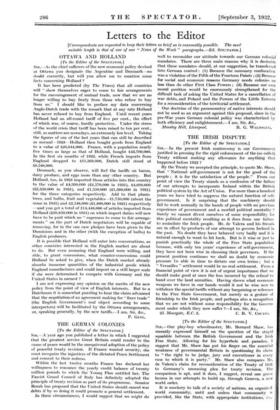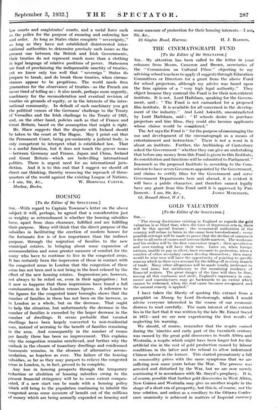[To the Editor of the SPECTATOR.] SIR,—Our play-boy schoolmaster, Mr.
Bernard Shaw, has recently expressed himself on the question of the stupid squabble between the British Government and the Irish Free State. Allowing for his hyperbole and .- paradox, I suggest that Mr. Shaw has put his finger on. the essential weakness of governmental: Britain in questioning its claim to " the right to be judge, jury and executioner in every case to which it is party." Mr. Shaw also compares Mr. de Valera's claim for reconsideration of the Treaty of 1921 to Germany's unceasing plea for treaty revision. The comparison is apt, and it does, I suggest, reveal one, grave lacuna in our attempts to build up, through Geneva, a new world. order.
It is mockery to talk of a society of nations, an organized world . community, . until and unless that community. provided, like the State, with .appropriate institutions, i.e.,
law courts and magistrates' courts, and a social force such as the police for the purpose of ensuring and enforcing law and order. As long as States claim complete " sovereignty," as long as they have not established disinterested inter- national authorities to determine precisely such issues as the present one between the British and Irish Governments, their treaties do not represent much more than a clothing in legal language of relative positions of power. Statesmen are fond of proclaiming the indispensable sanctity of treaties, yet we know only too well that " sovereign " States do prepare to break, and do break those treaties, when circum- stances appear to be propitious. The world needs firm guarantees for the observance of treaties—as the French are never tired of telling us it also needs, perhaps more urgently, machinery for the reconsideration and eventual revision of treaties on grounds of equity, or in the interests of the inter- national community. In default of such machinery you get the political venom of the Germans' challenge to the Treaty of Versailles and the Irish challenge to the Treaty of 1921, and, on the other hand, policies such as that of France and Great Britain, based on the assumption that might is right.
Mr. Shaw suggests that the dispute with Ireland should be taken to the court at The Hague. May I point out that the Permanent Court, being pre-eminently a judicial body, is only competent to interpret what is established law. That is a useful function, but it does not touch the graver issues —between Germany and France, Japan and China, Ireland and Great Britain—which are bedevilling international politics. There is urgent need for an international juris- diction. And it is to this end that I suggest we should all direct our thinking, thereby removing the reproach of three- quarters of the world against the existing League of Nations.































 Previous page
Previous page